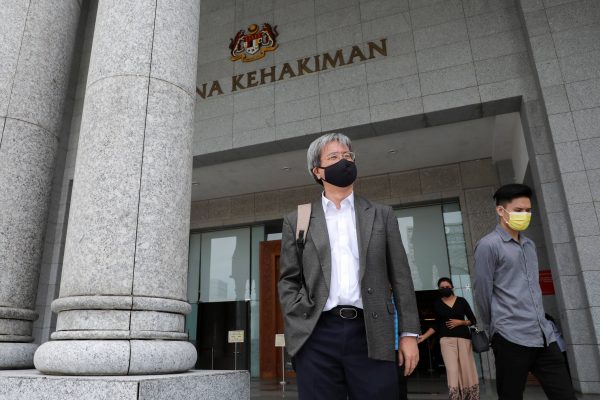Advocates attacked the decision as a blow to press freedom, and within five hours of the decision, Malaysiakini’s legal defence fund received contributions of over RM505,000 (US$135,000). This was an expression of public unease, not only with the verdict but more broadly with Malaysia’s highest court.
The case started in June 2020 when Attorney General Idrus Harun initiated contempt of court proceedings against Malaysiakini and Gan, alleging that comments in an earlier article implied ‘that the judiciary committed wrongdoings, is involved in corruption, does not uphold justice and compromised its integrity’. Malaysiakini, Idrus stated, by facilitating the publication of ‘demeaning’ attacks on the judiciary, had ‘threaten[ed] public confidence in the judiciary and … [was] clearly aimed at tarnishing the administration of justice by the judiciary’.
Relying on both the Communications and Multimedia Act 1998 and the Penal Code, the Attorney General in his application then cited Section 114A of the Evidence Act, which places the burden of proof on anyone ‘facilitating the publication of any content online’. It thus left it to Malaysiakini to convince the justices that the news portal was not responsible for facilitating the offending third-party comments. For most of the justices it failed to do so, leaving only Justice Nallini Patmanathan to dissent from the verdict.
Malaysia’s courts have been repeatedly thrown into the limelight due to a string of cases since 2018 involving former prime minister Najib Razak, accused of siphoning billions of dollars from a government investment fund he once controlled. In 2019, Court of Appeal Judge Hamid Sultan Abu Backer filed an affidavit with the High Court, claiming widespread judicial misconduct — accusations the government chose not to investigate. Instead, the internal Judges’ Ethics Committee suspended Abu Backer until retirement.
In 2021, former attorney general Tommy Thomas (2018–2020) published his best-selling My Story: Justice in the Wilderness, a tell-all of his time in office, detailing political meddling and failures in prosecuting high-profile corruption cases, which prompted several suits against him for defamation and other charges.
Paradoxically, Malaysia’s judges have shown renewed reform momentum and independence under the previous leadership of former chief justice Richard Malanjum (2018–2019) and current Chief Justice Tengku Maimun Tuan Mat. So what do recent developments tell us about the current state of Malaysia’s courts? And what might the future bring?
In the current context, it is important to consider political dynamics. A number of developments contributed to the recent propelling of the courts into the political fray: the end of the United Malays National Organisation’s dominance in 2018; the fall of the reformist Pakatan Harapan coalition government in 2020 through legislative backroom deals that brought Prime Minister Muhyiddin Yassin to power; and a current coalition that is so weak that it lacks public legitimacy.
Since independence in 1957, Malaysia’s courts have been perceived as conservative — the longstanding domestic practice has been strict legalism, marked by narrow, formalistic review of the Constitution. Although the judiciary was initially seen as competent and independent, that independence was severely undermined in 1988 when then prime minister Mahathir Mohamad responded to growing judicial assertiveness by removing, among other judges, the Lord President of the then-Supreme Court and five of his colleagues.
Since that action, recognised as a watershed event in Malaysia’s constitutional history, the judiciary has been viewed as deferential to the executive. Former prime minister Abdullah Badawi made an effort to move past the 1988 constitutional crisis and strengthen the independence and autonomy of the courts by creating an independent judicial appointments commission in 2009 but with limited effect.
Our recent empirical study of the Federal Court in 102 high-profile political cases between 1957–2008 offers considerable evidence that ethnicity, appointment after 1988 and the appointing prime minister were closely associated with the direction of voting in ‘mega-political’ cases. The study lends support to widely held public concerns that nonjudicial factors shape Federal Court decisions, particularly since 1988. It also raises uncomfortable questions about what the growing involvement of courts in politics might mean for Malaysia’s future.
Recent positive reactions to a number of appointments to the Federal Court, and a string of surprisingly courageous Court decisions in 2021 in contested religious matters, imply that the jury is still out on the direction the Federal Court will take.
Perhaps what is at play here is a phenomenon seen widely in appellate courts around the globe: once threatened institutionally, particularly in uncertain times, courts often choose tactics that protect their institutional self-interest. It is unfortunate that such behaviour has come at a time when, under Muhyiddin Yassin’s government, crackdowns on press freedom have increased, and the government is suspected of using the COVID-19 emergency to extend its hold on power despite a lack of parliamentary support.
Malaysia is in for an interesting ride. How the Federal Court, and the judiciary at large, will position itself in these volatile times, including how it responds to public criticism, will be crucial for the rule of law and how rules-bound governance will develop as part of an uncertain political transition.
Björn Dressel is Associate Professor at the Crawford School of Public Policy, The Australian National University.
This article is part of the Supporting the Rules-Based Order in Southeast Asia project run by the Department of Political and Social Change at the Australian National University and funded by the Australian Department of Foreign Affairs and Trade.
All views expressed in this article are entirely the author’s own and are not meant to represent those of the ANU or DFAT.

